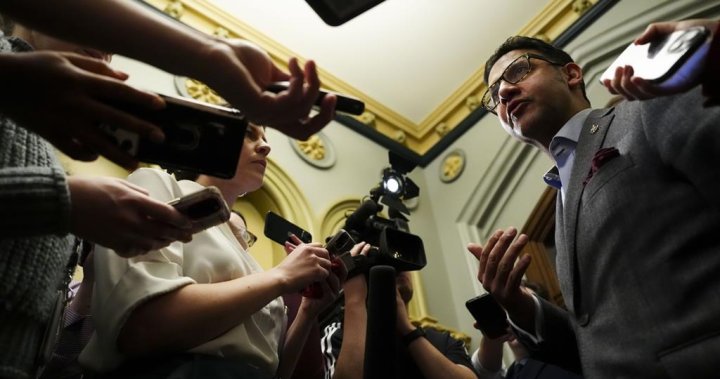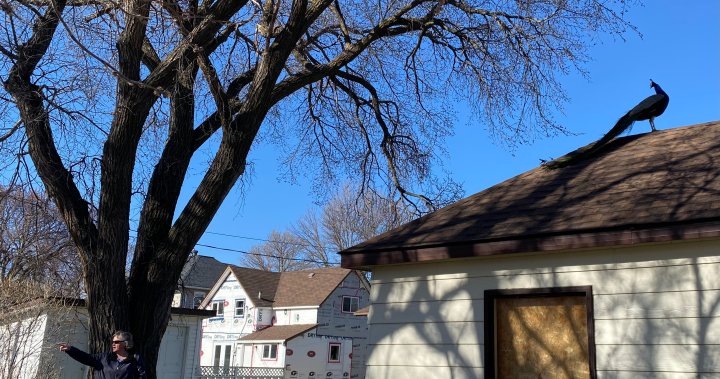Justice Minister Arif Virani is coming out against Conservative Leader Pierre Poilievre for suggesting he would use the notwithstanding clause for the first time at the federal level to get around court decisions on bail.
Poilievre also said in that speech that he wants to bring in more consecutive instead of concurrent sentences — stacking sentences on top of each other rather than serving them at the same time — which are controversial and not commonly used in Canada.
“I think Pierre Poilievre demonstrated very clearly to the Canadian public what his true intentions are with respect to the notwithstanding clause and how easily he would use it,” Virani said Tuesday morning.
“He is effectively quite willing to follow the lead of many premiers in this country who have decided to use or threaten to use the notwithstanding clause.”
The notwithstanding clause is a provision in Charter of Rights and Freedoms, Section 33, that allows the federal or provincial governments to override court rulings and enact legislation notwithstanding the provisions of the constitution.
It allows legislation that would violate certain sections of the Charter, including legal rights and equality rights, to be effectively overridden for a period of no more than five years, before the invocation of the clause sunsets.
The notwithstanding clause cannot be used to override the right to vote, language rights, mobility rights or the sections on the sitting of the House of Commons or provincial legislatures.
In his speech to the Canadian Police Association (CPA) Monday afternoon, Poilievre told attendees that a Conservative government would bring in a law that would prevent people with a “long rap sheet” of violent offences or high-value property crimes from getting bail.
He also said the Conservatives would bring in a law preventing people with similar records from receiving house arrest.
The email you need for the day’s
top news stories from Canada and around the world.
“All of my proposals are constitutional, and we will make sure – we will make them constitutional using whatever tools the constitution allows me to use to make them constitutional. I think you know exactly what I mean,” Poilievre said during a speech to the Canadian Police Association Monday afternoon.
“They will happen, and they will stay in place. I will be the democratically elected prime minister, democratically accountable to the people and they can then make the judgements themselves on whether they think my laws are constitutional, because they will be.”
A spokesperson for Poilievre confirmed he was referring to the notwithstanding clause.
“As you know, Mr. Poilievre has openly spoken about using that section of Canada’s Constitution in the past … as he did again yesterday,” Sebastian Skamski said.

Virani said it is essential to defend the rights of the accused as a pillar of democracy.
“It is not popular sometimes to defend people’s Charter rights, including those who are accused of criminality, but it is absolutely critical in a democracy,” Virani said.
During his speech, Poilievre pointed to the prison transfer of notorious serial killer Paul Bernardo from a maximum-security facility to a medium-security penitentiary last year, which was done under a 2018 Criminal Code amendment saying inmates should be held in the “least restrictive” environment possible.
“We’re going to repeal that, and it will be an automatic fait accompli that multiple murderers will stay in maximum security, and by the way they will have consecutive, not concurrent sentences. Multiple murderers will only come out of jail in a box,” Poilievre said to applause from the CPA attendees.
The notwithstanding clause has never been used at the federal level, but has been used several times by various premiers.
Recent examples include Saskatchewan Premier Scott Moe using the notwithstanding clause last fall to go ahead with a policy to require parental consent for children under 16 to change their name or pronouns in school amid a court challenge.

Quebec used it in 2019 and earlier this year to shield its controversial Bill 21 from court challenges, and Ontario used it in 2021 over election spending rule changes.
Ontario Premier Doug Ford has threatened use of the bill of other occasions as well before deciding against it in those other cases.
Virani urged caution in demonizing people accused of crimes, pointing to the recent acquittal of Umar Zameer, who was granted bail and ultimately acquitted in the first-degree murder trial of Const. Jeffery Northrup in Toronto.
“When he was granted bail, people with elected office, including the premier and two mayors in the Greater Toronto Area, all declared that that was a tragedy and an injustice, declaring, how could such an individual be possibly granted,” Virani said.
“Bail is constitutionally protected under Section 11. I would encourage Mr. Poilievre to take a look at that document, but I’m sure he’s already looking at which other Charter right he can trample on.”
© 2024 Global News, a division of Corus Entertainment Inc.





